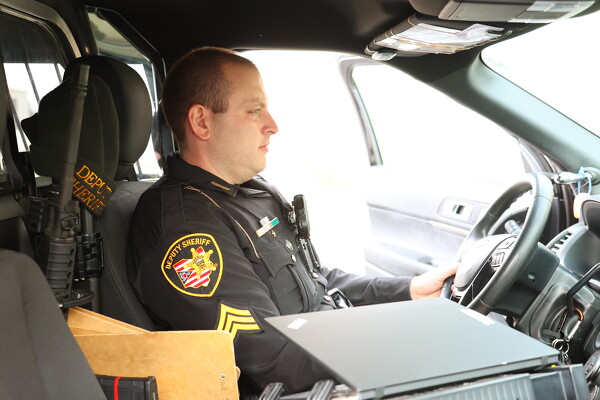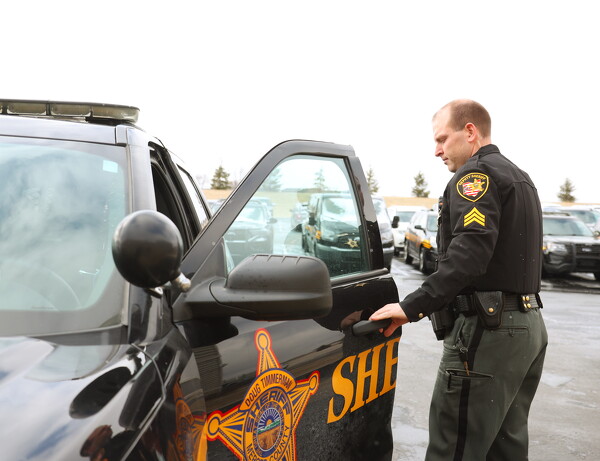
Patrol Sergeant Kyle Fink begins his shift at the Mercer County Sheriff's Office on Thursday afternoon.
CELINA - While most of Mercer County is preparing to soon clock out for the day at around 2 p.m., Patrol Sergeant Kyle Fink of the Mercer County Sheriff's Office is just starting his day patrolling the road.
In between routine park or business checks and serving various court papers, Fink patrols the roads throughout the southern half of Mercer County and handles calls as they come through dispatch.
"We don't necessarily have to go to the office," he said. "Everyone's day-to-day is a little bit different. It just depends on their assigned duties. I'm one of the two people in the evidence room. So, you know, say we did a search warrant yesterday, (then) I know I'm probably going to spend a decent amount of time in there (the evidence room) the next day."
The sheriff's office enforcement division is responsible for patrolling Mercer County's 14 townships and one city at all times. At their current staffing levels, usually two deputies work 10-hour shifts at a time, one in the north and another in the southern part of the county, splitting it at State Route 29. Personnel in the corrections division at the sheriff's office work 12-hour shifts, while the dispatchers work 8-hours at a time.
Deputies can never get too comfortable, as their shift can switch from an uneventful patrol along back roads to a shift full of one complex emergency after the other.
"Yesterday, for example, I worked from 2 p.m. to 4 a.m. because I covered for third shift too," Fink said. "We had a crash on state line at about 5 p.m. maybe. We might've had a suicide threat, I think, and then I had a domestic later in the night, and then we had another injury accident."
Fink, a Celina High School graduate, earned a bachelor's degree from Ohio State University in criminology, then attended the police academy at Wright State University's Grand Lake campus. He began working for the Mercer County Sheriff's Office in January 2016 in corrections and a little over a year later transferred to the enforcement division. He was promoted to his current rank of patrol sergeant in September and serves as the second shift supervisor.
In addition to working the evidence room, Fink is also a member of the office's crash reconstruction team. The team is usually called to the scene of fatal accidents, or otherwise serious accidents, he said.
"The reconstruction team (members have) about seven weeks worth of training," he said. "For the most part we're just going out there … and we're just forensically mapping like all the points, the tire marks, where the cars are. So we're not doing too much on the reconstruction aspect of it, but we're forensically mapping like where everything is."

Patrol Sergeant Kyle Fink begins his shift at the Mercer County Sheriff's Office on Thursday afternoon.
Fink said his favorite thing about patrolling is that every shift brings something different. His least favorite thing about the job is having to give a death notification.
"Those are usually not during the daytime, so you're usually waking someone up in the middle of the night," he said.
The most surprising thing about the job was the amount of paperwork that's required, Fink said.
"Say you arrested someone for domestic (domestic violence), you're doing Marsy's Law (paperwork), you're doing a domestic violence packet, you have to come back to the office and type out your charges, and then you have to go to municipal court, get them signed there," Fink said. "You have to give copies to the jail. Then you have to give copies to the suspect that you arrested. You have to type out a court narrative for them so when (they go) to court they can read off what happened. There's just a lot more that goes into it."
Marsy's Law, which gives crime victims meaningful and enforceable constitutional rights equal to the rights of the =accused, requires specific paperwork to inform victims of their rights and to request accommodations.
At the start of his shift, prior to using his cruiser's speed radar, Fink has to calibrate it using special tuning forks to ensure its accuracy.
By striking two tuning forks together, the user gets them to vibrate at a known frequency, simulating a vehicle moving at a specific speed. Fink's tuning forks measure at 35 mph and 30 mph. This allows him to verify the radar's accuracy and adjust if necessary to ensure the device is reading speeds correctly.
The sheriff's office does not have a quota for tickets, Fink noted. Deputies have a lot of discretion when it comes to the speeds they'll pull someone over for, with some being a little more strict with the limit than others.
"Basically the way we do radar is, when you see a car coming at you, you estimate the speed first. Then you can turn your radar on and then it should match up within a couple miles an hour of your estimate," Fink said. "But obviously, I don't stop anyone with a speed unless I get it locked in."
Following the legalization of recreational marijuana in November 2023, Fink said he's noticed a slight uptick in marijuana-related OVIs. Officers undergo ARIDE (advanced roadside impaired driving enforcement) training to learn how to conduct various drug impairment tests on the road.
Deputies in the enforcement division have to spend a lot of time riding the roads alone, but they appreciate the fact that someone always has their back. Fink said even the boss - newly sworn-in Sheriff Doug Timmerman - isn't averse to making an occasional traffic stop or serving papers from time to time.
"Since Timmerman's been elected, he's been out and about a little bit," Fink said. "He's made traffic stops. He's done paper services. He's shown up on calls with us. He likes to be very involved."
Fink added that the sheriff's office is also well-supported by its citizens.
"We're pretty well-supported," he said. "I'd say the community supports us (more) around here compared to what you're seeing in some of the bigger cities."


